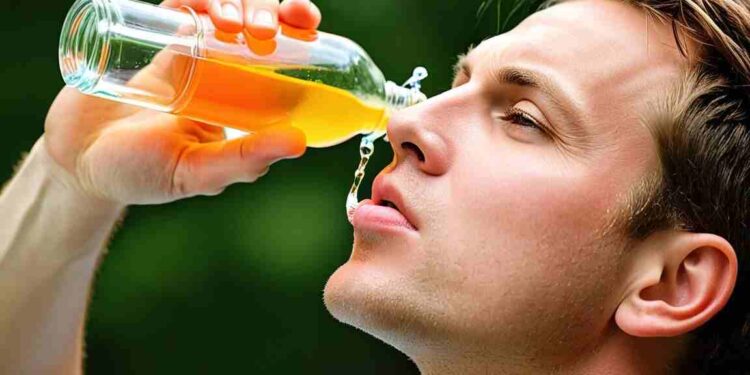Introduction
Erectile dysfunction (ED) is a common concern affecting millions of men worldwide. While it is often linked to underlying medical conditions such as diabetes, cardiovascular diseases, or psychological factors, one lesser-known but significant contributor is dehydration. Water is essential for overall health, including circulation, hormone production, and nerve function—all of which play a role in achieving and maintaining an erection. This article explores the connection between dehydration and ED, detailing how insufficient water intake might impact sexual performance.
Understanding Erectile Dysfunction:
What Is Erectile Dysfunction?
Erectile dysfunction is the inability to achieve or maintain an erection firm enough for sexual intercourse. While occasional difficulties with erections are normal, persistent issues can indicate an underlying health problem that requires medical attention.
Common Causes of ED
Several factors contribute to ED, including:
- Physical Causes: Cardiovascular disease, diabetes, obesity, and high blood pressure.
- Psychological Causes: Stress, anxiety, and depression.
- Lifestyle Factors: Poor diet, excessive alcohol consumption, smoking, and dehydration.
- Medications: Certain drugs for blood pressure, depression, or prostate conditions.
The Role of Hydration in Sexual Health
Importance of Hydration in the Body
Water is crucial for almost every bodily function, including circulation, temperature regulation, and waste removal. Proper hydration ensures that blood flows efficiently to all organs, including the penis.
Dehydration and Blood Circulation
Dehydration leads to a reduction in total blood volume, causing blood to become thicker. This makes it harder for the heart to pump blood efficiently, leading to poor circulation. Since an erection relies on healthy blood flow to the penile tissue, reduced circulation can lead to difficulties achieving or maintaining an erection.
How Dehydration Contributes to ED
1. Reduced Blood Volume and Flow
One of the primary reasons dehydration can cause ED is that it decreases blood volume. Less blood means reduced oxygen and nutrient transport, leading to poor vascular function and weaker erections.
2. Hormonal Imbalances
Proper hydration supports hormone production, including testosterone, which is vital for sexual function. Dehydration can lead to increased cortisol (the stress hormone), which can suppress testosterone levels and diminish libido.
3. Increased Stress and Anxiety
Even mild dehydration can trigger fatigue, irritability, and stress—psychological factors that contribute to ED. Anxiety about sexual performance can further exacerbate the problem, creating a cycle of stress and erectile difficulties.
4. Impact on Nerve Function
Nerve signaling is essential for arousal and erection. Dehydration can impair nerve function, leading to reduced sensitivity and responsiveness during sexual activity.
Symptoms of Dehydration That May Affect Sexual Health
- Dry mouth and excessive thirst
- Fatigue and dizziness
- Dark-colored urine
- Headaches and confusion
- Decreased urine output
If you experience these symptoms frequently, they may be affecting your sexual performance as well.
Preventing Dehydration and Improving Erectile Function
1. Drink Enough Water Daily
A general recommendation is to drink at least 8 cups (64 ounces) of water per day. However, this varies based on factors like climate, physical activity, and individual needs.
2. Monitor Your Hydration Levels
Checking urine color is a simple way to assess hydration. Pale yellow indicates proper hydration, while dark yellow or amber suggests dehydration.
3. Reduce Alcohol and Caffeine Intake
Both alcohol and caffeine can contribute to dehydration by increasing urine production. Moderating consumption can help maintain better hydration levels.
4. Eat Hydrating Foods
Fruits and vegetables with high water content, such as watermelon, cucumbers, and oranges, can aid in hydration.
5. Manage Stress and Anxiety
Since stress can exacerbate ED, incorporating relaxation techniques like meditation, deep breathing, or counseling may help.
Can Drinking Water Help Erectile Dysfunction?
Yes, drinking enough water can help with erectile dysfunction (ED) in certain ways. Dehydration can affect blood flow, which is essential for an erection. When you’re dehydrated, your blood volume decreases, which could lead to lower circulation and potentially impact sexual performance. Proper hydration helps maintain good cardiovascular health, which is important for sexual function.
Why Did You Suddenly Develop ED?
There can be many reasons for sudden ED, including physical, emotional, or lifestyle factors. Some common causes include:
Physical Causes:
- Heart disease
- Diabetes
- High blood pressure
- Hormonal imbalances
Psychological Factors:
- Stress
- Anxiety
- Depression
Lifestyle Factors:
- Smoking
- Alcohol use
- Poor diet
- Lack of exercise
If it’s a sudden issue, it may be worth discussing with a healthcare provider, as they can help pinpoint the cause and suggest possible treatments.
Can Dehydration Cause Lack of Arousal?
Yes, dehydration can lead to lower energy levels and reduced blood flow, which may affect your overall sense of arousal or ability to get and maintain an erection. Dehydration can also lead to fatigue and mood changes, both of which can contribute to reduced sexual interest.
Can Not Eating Enough Cause Erectile Dysfunction?
Yes, poor nutrition or not eating enough can contribute to ED. A lack of essential nutrients can affect your hormone levels, energy, and blood circulation, all of which are crucial for sexual function. For example, deficiencies in vitamins like B12, zinc, or magnesium can impact sexual health, and not consuming enough calories may reduce energy and testosterone levels, making arousal and erections harder to achieve.
If you’re concerned about ED or any of these factors, it’s a good idea to talk with a doctor or a specialist. They can help you understand the root cause and find ways to manage or treat it.
When to Seek Medical Help
If dehydration is corrected but ED persists, it may indicate an underlying medical condition. Consulting a healthcare professional can help identify and address any other contributing factors.
Conclusion
While dehydration is often overlooked as a cause of erectile dysfunction, its effects on circulation, hormone balance, and nerve function make it a potential risk factor. Maintaining proper hydration by drinking enough water and adopting healthy lifestyle habits can improve overall sexual health. If ED continues despite adequate hydration, seeking medical advice is essential to rule out more serious conditions. Staying hydrated is a simple yet crucial step in promoting optimal sexual function and overall well-being.










Discussion about this post